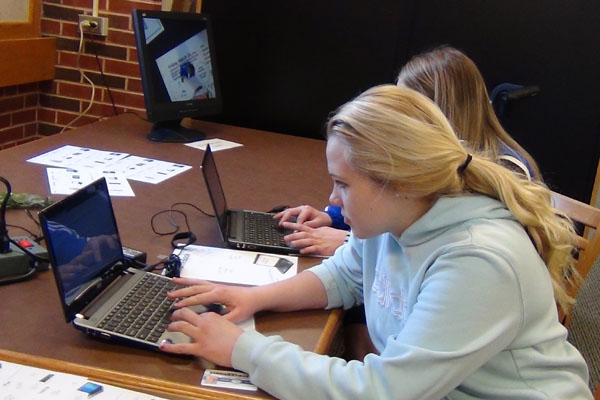One-to-one is on its way
Will students and teachers adapt to changing technology?

Students had a chance to experiment using Chromebooks during the “Technology Petting Zoo” Library event. In a few years, every student will be equiped with a Chromebook of their own.
March 14, 2014
In the past few years, the technological atmosphere of RB has changed drastically. Students are using their phones throughout the building, in class and out, and although some teachers complain about it or confiscate the phones, that hasn’t yet made them go away. Now RB is on the threshold of a new technological era: one to one Chromebooks.
How will this change how students and teachers work in the school? Will it help or hinder the learning process? I can only speculate, and I won’t even be around for the event, but here are some things to consider.
With every student possessing an electronic device which is not just tolerated in class, but actually used as part of the lesson, something will have to change in regards to how students are forced to pay attention. In today’s ironically low-tech area, it’s fairly easy to see when someone is blatantly not paying attention. They may be sleeping, in which case it will be very easy to tell; they may be doing other homework which, with a close enough glance at their papers, is also not as secretive was they might like to think; or they may be using their phones. In the latter case, it will be not-so-surreptitiously hidden behind a backpack or in a lap.
But if a lesson requires the use of a Chromebook, then other homework and distracting websites might just be in another window. It will be much, much harder for teachers to tell when students are doing what they’re supposed to be doing, and when their minds are somewhere else altogether.
If teaching via Chromebooks is going to work, some sort of policy will have to be developed regarding the use and abuse of the internet at opportune and inopportune times. This could involve being really strict about when chromebooks can come out and when they have to stay turned off, or more stringent participation grades, so that those who don’t do their work will watch their grade suffer. If it’s possible, certain sites might end up being blocked from the school’s internet system. This has it’s problems too, though, as teachers may want to use blocked sites for certain lessons, and there are always substitute sites or ways to get around the blocks.
Then, of course, there’s the question of what the students will do with the devices. The speculation above assumes that many students will use them for non-class related activities. Some undoubtedly will. Others might use the increased capabilities of their devices to do some remarkable work, both for school projects and outside experiments.
There’s the possibility, of course, that those who start out the year by goofing off on their tablets might come to see the drawbacks of that course of action, and change their ways to focus more on their work. An unexpected F (or series of F’s) might be enough to alter their mindset, especially if it comes with some other punishment such as being grounded.
On the other hand, habits are hard to break, and if someone has gotten into the habit of checking their twitter account during second period, they might easily fall into the temptation to keep it up, especially if their lives are not suffering much because of poor grades. Even if they are suffering, sometimes instant gratification wins out over long-term success. That’s something that every teenager seems to struggle with– it doesn’t make sense that a school should be sanctioning temptation.
But say the Chromebooks aren’t a distraction. Say they work excellently, and students begin keeping everything on there. Their planner, their homework assignments, their creative projects… everything will be contained on the one device. While this might sound convenient, imagine if the Chromebook gets lost (not too hypothetical situation when dealing with teenagers) or stolen (again, not a scenario that’s alien to RB). What if they simply forget to charge the tablet, and as a result miss out on whatever lessons certain classes have planned for that day? What if people realize this and start leaving their Chromebook in a perpetual state of powerlessness, thus making “my Chromebook is dead” the new “my dog ate my homework.”
Of course, that’s of course not even scratching the surface of what would happen if your dog was to eat a Chromebook.
Then, of course, there’s the technical aspect of the Chromebooks. Technology, as we’ve all experienced, has the tendency to get finicky and decide not to work at the worst possible moment. Multiply that by 1500 or so students in the school, not all of whom are the computer geniuses the stereotype claims we are, and you’re going to need a heck of a lot of tech support. Do we currently have this extent of expertise? I don’t think we do.
Add to that the inconvenience such difficulties will add to planning and executing everyday lessons. Downtime might become a more prominent feature of the classroom as people wait for things to load… reload… refresh… and for problems to be fixed. Is this really the best use of school time?
All these problems might only be worsened by the sheer number of Chromebooks all using the same internet bandwidth. What we’ve got now can barely keep up with all the phones and computers in the building; recall Principal Bylsma’s announcement at the end of the soft lockdown that the student’s phones were making it impossible for her to get through to the parents. It seems apparent, therefore, that the school will really need to revamp their infrastructure before 1500 new devices arrive. Do we have the time or the money to do this? I hope so, because otherwise the Chromebook initiative is bound for a very… slow… start…
All these are my initial reactions regarding the practical aspects of implementing Chromebooks in RB life. They would seem for the most part to be causing more difficulties than benefits, although that would largely depend on how the teachers utilize these new capabilities. Some, no doubt, will come up with very innovative ideas that both students and teachers can enjoy. Others might have more trouble shaping their lessons to a new generation of permanently plugged in teenagers.
What everyone, administrators, teachers, and students, should remember is that a website is not a substitute for a good teacher. High School is a place where students must work more independently, but it’s not a place where they should always need to teach themselves. If the administration is prepared to spend a significant amount of money on new devices, it’s their responsibility to make sure that RB teachers are valued just as much.
Whatever the result, the phone-laden RB we’re living in today is only going to evolve further, changing the entire look, feel, and capabilities of our population. While it won’t be a clear all-bad or all-good change, there is a lot of room for problems and failures unless RB is prepared with a strategy for the likely problems.
Are we ready for this?


